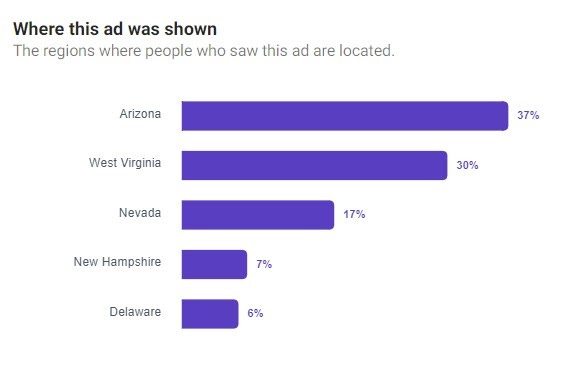Corporations are intensifying their multi-million dollar lobbying campaign against the Build Back Better legislation (BBB). The Business Roundtable — a group of dozens of top CEOs including Apple's Tim Cook, Walmart's Doug McMillon, and GM's Mary Barra — is spending hundreds of thousands of dollars on Facebook ads encouraging people to contact their Senators. "Tell your Senator to oppose harmful tax increases on job creators," the ad says.
The ad doesn't mention that BBB no longer raises the corporate tax rate but instead establishes a new minimum rate of 15% on corporations with $1 billion or more in annual profits. It would prevent highly profitable corporations from continuing to pay no corporate taxes at all.
The purpose of the ad is to give Senators Joe Manchin (D-WV) and Kyrsten Sinema (D-AZ) there is grassroots opposition to BBB. Most of the ad impressions are targeted at Arizona and West Virginia Facebook users.
Meanwhile, the US Chamber of Commerce — which represents nearly every major corporation in the United States — has released a public letter to members of Congress reiterating its opposition to BBB. Notably, the Chamber raises concerns about "the impact of the legislation on workforce participation, especially given the large amounts of transfer payments that are not connected to work."
But the bill, which the Chamber is spending millions to defeat, includes investments that would help parents rejoin the workforce. Specifically, BBB contains provisions that would make childcare more affordable for millions of families and make pre-K universal for three and four-year-olds. The lack of support for working families is what is driving many parents, especially women, out of the workforce.
Why millions of women left the workforce
About 3.5 million women with school-aged children "either lost jobs, took leaves of absence or left the labor market altogether" in the spring of 2020. Schools and daycares closed and, in most households, women bear the brunt of responsibilities for childcare and other household duties:
Decades of research shows that women do significantly more housework and childcare than men—so much so that women who are employed full-time are often said to be working a “double shift.” Now women, and mothers, in particular, are taking on an even heavier load. Mothers are more than three times as likely as fathers to be responsible for most of the housework and caregiving during the pandemic. In fact, they’re 1.5 times more likely than fathers to be spending an additional three or more hours per day on housework and childcare.
Schools have reopened but many women have not returned to the labor force. Why? According to Janet Currie, co-director of the Program on Families and Children at the National Bureau of Economic Research, the difficulty of finding affordable high-quality childcare is a major factor:
A major reason, Currie noted, is the worsening difficulty of finding reliable and affordable child care.
That crisis, Currie suggested, is “probably making some people’s minds up for them, because if you can’t get childcare and you have young children, somebody has to look after them.”
The average monthly cost of licensed childcare for an infant in the United States is over $1300 per month. In many states, the cost is far higher. A lot of women are staying out of the workforce because they have no other options.
Even among women who kept their jobs, one in three are "are considering downshifting their career or leaving the workforce," according to a new report by McKinsey. Among those considering scaling back or ending their professional careers, "a majority cite childcare responsibilities as a primary reason."
How BBB would expand access to affordable childcare
BBB would give more families access to childcare by capping the cost to a reasonable percentage of family income. Here is the White House summary:
Limit child care costs for families to no more than 7% of income, for families earning up to 250% of state median income. It enables states to expand access to about 20 million children. Parents must be working, seeking work, in training or taking care of a serious health issue.
The benefit is phased in over a three-year period. During that time, the federal government will invest $100 billion to subsidize childcare services and build up capacity. After the first three-year period, the federal government would assume 90% of the cost of the program and states would contribute 10%. The money would also provide a "living wage" to childcare providers. One of the reasons there is a childcare shortage is that providers are frequently offered poverty-level wages.
BBB would provide universal preschool for three and four-year-olds. This would "expand access to free high-quality preschool for more than 6 million children." While many states offer some pre-K programs, currently only 6% of three-year olds and 34% of four-year-olds are enrolled — largely because chronic funding issues limits capacity. In addition to the educational benefits, preschool will reduce the cost of childcare for families with young children.
If the Chamber was concerned about the declining workforce participation, particularly among women, it would enthusiastically support BBB which give millions of parents the ability to rejoin the workforce. Instead, it is doing everything possible to kill the bill.
Corporations against expanding the child tax credit
The Chamber also says it is concerned about "large amounts of transfer payments that are not connected to work" in BBB. The only provision in BBB that could be described that way is the continued expansion of the Child Tax Credit.
The COVID relief package increased the Child Tax Credit from $2000 for every child under 17 to "to $3,600 for children under age 6 and $3,000 for children aged 6-17." BBB would continue that expansion for an additional year, through 2022. Afterward, the pre-pandemic $2,000 per child tax credit would be fully refundable, which means that a family could receive the full credit even if it exceeds the amount of their tax bill. The expanded Child Tax Credit has been remarkably effective in reducing child poverty.
The Chamber is suggesting that this is a bad idea. Instead, the group apparently wants to deny the full tax credit to these very low-income families and keep more children in poverty. It's a remarkably cruel and cynical approach to America's families — particularly from an organization trying to protect corporations with billions in profits from paying any taxes.







Corporations should be doing every thing they can to SUPPORT child care and invest in centers near their locations. I don't get it. Whine about not having employees then fight child care incentives?
The Chamber and its members are guilty of short-term thinking (which does not bode well for their long-term success). The only difference between them and the Taliban is that corporate America doesn’t use overt violence to coerce people. But they both advocate excluding half of their adult populations from participating in the economy. As long as as they oppose access for the people with the best minds, regardless of gender, they will lose the competition for dominance. Successful competition depends upon all participants being empowered to use their best skills and strengths to accomplish their best work. It is ridiculous to assume that the best skills of 50% of Americans are changing diapers and scrubbing bathtubs.